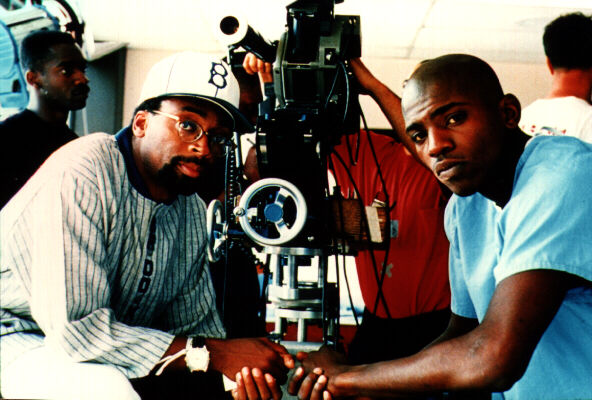 In a film that also thematizes shooting, Spike Lee wants to imagine Strike as a filmmaker who has to choose his shots carefully. To hammer home Strike's embodiment of film, Lee even names him after the first film made by Lee's own adopted cinematic father-Sergei Eisenstein. Lee avoids the problem of either having lots of 'shooting' / 'shooting' puns or making a self-referential filmmaking film (like his
Get on the Bus) by using trains as a cipher for filmmaking. And I'm sure he had Eisenstein and the Lumière brothers in mind as he chose this cipher.
In a film that also thematizes shooting, Spike Lee wants to imagine Strike as a filmmaker who has to choose his shots carefully. To hammer home Strike's embodiment of film, Lee even names him after the first film made by Lee's own adopted cinematic father-Sergei Eisenstein. Lee avoids the problem of either having lots of 'shooting' / 'shooting' puns or making a self-referential filmmaking film (like his
Get on the Bus) by using trains as a cipher for filmmaking. And I'm sure he had Eisenstein and the Lumière brothers in mind as he chose this cipher.
Strike ends the film by striking out on his own, funded by drug money, on the caprice of a racist cop and having alienated his family and friends. There is reason to be pessimistic about Strike's chances. His escape from the ghetto was as forced onto him by the cop Klein, just as his route to advancement by 'gatting' Darryl was forced onto him by Little. Nothing has changed in him, and nothing has changed in the hood-we see his homey 'Scientific' as the latest shooting victim, even as Strike rolls away. The problems of the smaller train set (Strike's neighbourhood) will simply be replicated in the bigger train set (the rest of U.S. society). The desire for money from crack that drives the drug trade has been replaced by the desire for money from 'legal' business that drives materialistic capitalism, but none of the underlying challenges have been met, none of the problems resolved. So long as Strike remains passive, and allows his behaviour to be determined by forces outside his control, there is little chance that Strike can become Spike, and turn his powers to addressing or redressing the wrongs of the ghetto.
Clockers is an unusual film for Hollywood. It is a 'big train set' film that seriously engages with the challenges of the director's, and America's, home. One wonders if Spike Lee's domestic turn has something to teach our political leaders: before advocating regime changes in the rest of the world, it would be as well for the members of the Bush regime to spend some time thinking about the domestic challenges of poverty, homelessness, racism, ballot-rigging, bribery, and fraud. Otherwise, aren't they, too, likely just to replay the problems of America's domestic model trains on a bigger, global train set?

Sean Penn and intertextuality
September, 2002
The limited vision of Minority Report
August, 2002
The undervalued genre of airplane movies
July, 2002
The personal politics of this summer's blockbusters.
June, 2002
A review of "The Paradise Institute," a meditation on frames, judgment,
and power.
May, 2002
CBS's packaging of the '9/11' documentary reveals exactly what America
fails to understand about September 11.
April, 2002
Frederick Wiseman takes us inside the pervasive, sinister institution of
domestic violence.
March, 2002
Cinema can help expose ourselves to the world, or it can seduce us to sit
back and relax.
February, 2002
Harry Potter is cute, but is it a bad thing that adults crave escapism?



film politics music jay's head poetry art josh ring saddies about archive